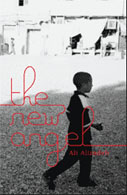 | Ali Alizadeh THE NEW ANGEL Transit Lounge, 254 pp. Source: review copy Review by Michael Freedman |
Debut novels are often the most interesting to read, and certainly the most interesting to review. Like debut albums, an artist puts their heart and soul into their first novel, and it is the initial work that is often the most personal. After all, the debut novelist never knows when they will be published again, and if the novel is not well received then Andy Warhol's musings of the length of fame may take on a more literal meaning. It really is a case of get it right first time, because, like everyone else, novelists rarely get a second chance to make a first impression.
I suspect that The New Angel is an intensely personal work for its author, and not just because it is his first novel. While he may be new to the novel game, Ali Alizadeh is an accomplished, published and award winning writer already. He writes, performs and edits poetry, holds a PhD, and has also collaborated on an award-winning film. But I suspect it is the subject matter of The New Angel which would hold special significance for Mr Alizadeh.
The New Angel's protagonists are Bahram and Fereshteh, who, like their literary creator, grow up in Iran, and live much of their childhood in conditions of unbelievable fear and violence. They are also a teenage couple who, despite living lives of unimaginable hardship, somehow find the time to meet to meet and fall in love. Much of the novel is set against the Islamic Revolution of the 1980s, and it is against this backdrop that the characters face their biggest tests.
In some respects this is a love story, and because for much of the novel the young lovers are 13 and 14 years old, and because they must face almost insurmountable external barriers to their relationship, comparisons to Romeo and Juliet are inevitable. But it is more than a love story, and is as much about violence and barbarity, religious intolerance, the innocence of childhood, and the horrors of complete helplessness as it is about love and desire. It is a tragedy - a work of fiction set against the background of the unbelievable atrocities committed during the Iran-Iraq War could scarcely be anything else - but the author engages the reader through Bahram, who narrates most of the novel, and what he finds funny we do as well.
Although The New Angel is set in an intensely religious and conservative Islamic country, it is not difficult to relate to the predicament of the characters. Fascism because of religious zeal is not so different to fascism motivated by racial differences, whether perceived or real. One of the characters, for example, would not be out of place if transplanted in whole cloth to Germany in the 30s and 40s. The mistrust and censorship of art, literature and its creators, indiscriminate death caused by technologically superior firepower, family members taking sides against each other, and the pervading fear and uncertainty of not knowing when the authorities are going to come for you. These are all familiar themes to anyone who has lived through a large scale war.
It is a strange and yet auspicious characteristic of human nature, that in such horrific and uncontrollable circumstances such as those in which the characters of The New Angel find themselves, something as poetic, romantic and all-consuming as young love can not only begin, but flourish. The characters of Bahram and Fereshteh at first captivate, then enthral, and in the end, in different ways, become victims of the time in which they lived. It is to the author's credit that a work that seems so personal, so emotional, and so raw, is able to provide such a powerful lesson about the best and worst of humanity.
